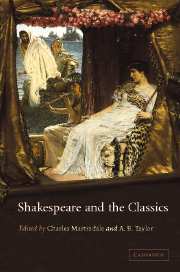Book contents
- Frontmatter
- Contents
- Notes on contributors
- List of abbreviations
- Introduction
- PART I AN INITIAL PERSPECTIVE
- PART II ‘SMALL LATINE’
- 2 Petruchio is ‘Kated’: The Taming of the Shrew and Ovid
- 3 Ovid's myths and the unsmooth course of love in A Midsummer Night's Dream
- 4 Shakespeare's learned heroines in Ovid's schoolroom
- 5 Shakespeare and Virgil
- 6 Shakespeare's reception of Plautus reconsidered
- 7 Shakespeare, Plautus, and the discovery of New Comic space
- 8 ‘Confusion now hath made his masterpiece’: Senecan resonances in Macbeth
- 9 ‘These are the only men’: Seneca and monopoly in Hamlet 2.2
- PART III ‘LESSE GREEK’
- PART IV THE RECEPTION OF SHAKESPEARE'S CLASSICISM
- Select bibliography (compiled by Joanna Paul)
- Index
9 - ‘These are the only men’: Seneca and monopoly in Hamlet 2.2
Published online by Cambridge University Press: 22 September 2009
- Frontmatter
- Contents
- Notes on contributors
- List of abbreviations
- Introduction
- PART I AN INITIAL PERSPECTIVE
- PART II ‘SMALL LATINE’
- 2 Petruchio is ‘Kated’: The Taming of the Shrew and Ovid
- 3 Ovid's myths and the unsmooth course of love in A Midsummer Night's Dream
- 4 Shakespeare's learned heroines in Ovid's schoolroom
- 5 Shakespeare and Virgil
- 6 Shakespeare's reception of Plautus reconsidered
- 7 Shakespeare, Plautus, and the discovery of New Comic space
- 8 ‘Confusion now hath made his masterpiece’: Senecan resonances in Macbeth
- 9 ‘These are the only men’: Seneca and monopoly in Hamlet 2.2
- PART III ‘LESSE GREEK’
- PART IV THE RECEPTION OF SHAKESPEARE'S CLASSICISM
- Select bibliography (compiled by Joanna Paul)
- Index
Summary
When Polonius arrives to announce the arrival of the Tragedians of the City, he describes them as ‘the best actors in the world’:
Seneca cannot be too heavy, nor Plautus too light. For the law of writ and the liberty, these are the only men.
(Hamlet 2.2.382–4)The idea that there is a relation of influence between classical and early modern drama is fundamental to any account of the English Renaissance. But Polonius inadvertently provides a clue to something a little less obvious, something we might adapt his own words to describe as a writ of theatrical liberty: the summoning up of classical writers such as Seneca and Plautus by practitioners of the Elizabethan professional theatre, and the suggestion that the appropriate frame of reference for this mutually emancipatory embodiment of authorship might be a conception of freedom within the law that increasingly characterised the economic and political culture of Elizabethan and Jacobean England. It is thus not surprising that the Players' Scene has long been recognised as a peculiarly intense, and intensely peculiar, engagement with classical sources, even though there is no real consensus as to what the nature of that engagement is. What is surprising is that no one has yet taken Polonius at his word and considered the possibility that the embodiment in question here is not Virgil or Ovid, as most commentators suggest, but Seneca. In this essay I propose not only a Senecan influence, but also a hitherto unrecognised source.
- Type
- Chapter
- Information
- Shakespeare and the Classics , pp. 156 - 168Publisher: Cambridge University PressPrint publication year: 2004
- 2
- Cited by



